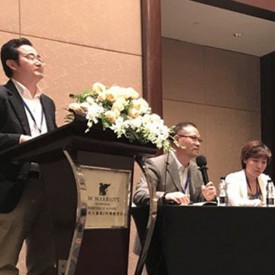The RV Industry Association’s trade mission to China kicked off with strong international participation with more than 70 in attendance on Wednesday, Oct. 17, at the JW Marriott Tomorrow Square in Shanghai. Multiple facets of the Chinese RV economy were represented and individuals from various sectors including the Shanghai Transportation Trade Association (STTA), Chinese RV manufacturers, suppliers, dealers and campground operators, offered their perspectives on the future of the RV industry in China, the obstacles for the industry in its current form and the greatest opportunities for American businesses.
Here’s what took place on day one from the event:
The day started off with welcoming remarks from STTA and Stuart Schaag, senior commercial officer from the U.S. Consulate in Shanghai where the U.S. government’s support of the event was noted and appreciated by all in attendance. A presentation followed by the manager of the Shanghai Auto RV plant, the number one auto and motorhome manufacturer in China. They expect to produce more than 2,500 motorhomes by the end of this year and up to 5,000 units next year in their new facility.
Shanghai Auto outlined its entire RV ecosystem with the group from RV production to rental, tourism and campground businesses. They also discussed their RV2GO app that provides assistance to more than 1.1 million consumers on every step of the RV journey.
A presentation from the China Automobile Technology and Research Center (CATARC) followed with an in-depth report on sales of RVs. CATARC reported that in 2017, sales increased by 12 percent over 2016.
“I didn’t realize that the Chinese RV industry sold a little over 20,800 units in 2017,” said Dave Schutz, senior vice president OEM RV sales with Dometic North America. “The market is growing, and will continue to expand, as more Chinese people are exposed to RVs.”
CATARC is responsible for developing RV standards and has worked closely with RVIA during the standards creation process. CATARC discussed the current standards and the areas still under development, including driver license requirements. Another representative from CATARC spoke about the requirements for RVs under China’s Compulsory Certification Program (CCC). Automotive products in China, including RVs, are required to comply with the CCC. Motorhome manufacturers can pass through the chassis manufacturers CCC compliance provided they stay within the design specifications detailed by the chassis manufacturer.
Following that morning was a panel discussion which consisted of a manufacturer, supplier, dealer, campground operator and an active RVer – all from China. A couple of themes emerged as the panel discussion unfolded:
- All of the participants see the RV industry in China booming in five years due to the support of the Chinese government’s policies, a huge wave of Chinese retiring and the Chinese people’s love of outdoor activities.
- U.S. travel trailers are preferred by the Chinese because of their size, comfort and durability. However, due to the current trade dispute between the U.S. and China and the related tariffs, customers are switching to domestically produced trailers.
- At this point, primarily campground operators are purchasing travel trailers. The purchasers of motorhomes tend to be Chinese consumers over 40 and price is their most important consideration in choosing a unit.
“A thought that hit me during the presentations was that while China is very diverse, the RV lifestyle is a great platform to help build a strong connection between the various regions of China,” said Paul Cassidy, senior vice president of business development of Erwin Hymer Group North America. “I see that as a huge positive and was happy to hear that the government has put their support behind the outdoor life and the RV lifestyle.”
The panel concluded by outlining some of the obstacles to the growth of the industry in China including:
- The need for consumer education on the RV lifestyle;
- Standards and regulations and the lack of coordination between government agencies. Many government officials do not understand the specific considerations and direct impacts of improperly and broadly applied regulations on the RV industry;
- Land use acquisition costs and restrictions for campgrounds; and
- Lack of parking areas.
Following the deeply perceptive panel discussion, RVIA President Frank Hugelmeyer shared an overview of the U.S. market with the group with a focus on how outdoor recreation and the RV industry specifically contributes to the U.S. national economy. He also made a point to explain how China could collect similar data in China to educate the Chinese government on the need to support the industry.
“We thank our Chinese hosts for a very informative day,” said Hugelmeyer. “From outlining the existing market to covering current regulations and providing excellent thoughts and ideas on how to take the Chinese market to the next level.”
Day one concluded with a closed presentation for the U.S. delegation from the U.S. Embassy and the American Chamber of Commerce (AmCham) in Shanghai on the current political and business environment in China for American businesses. Ken Jarrett, president of AmCham Shanghai, was extremely insightful and stated that Am Cham’s members remain upbeat on the China market despite the current trade dispute between the U.S. and China.
